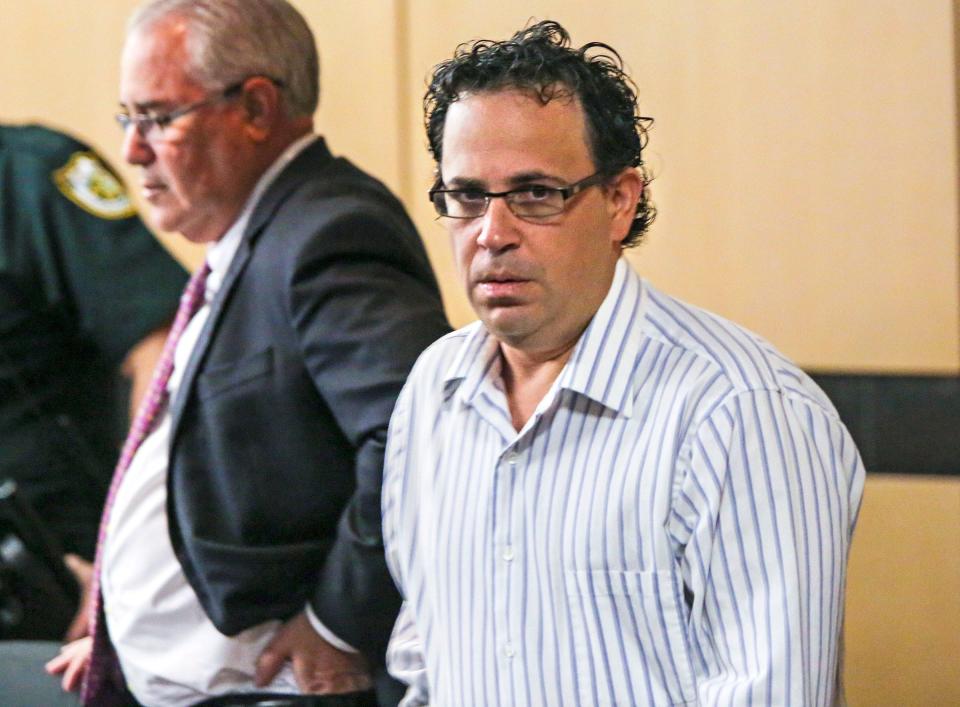Prosecutors fight Dr. Mark Agresti's bid for a new trial, say Kenneth Bailynson didn't lie to jurors
WEST PALM BEACH — Federal prosecutors are working to squash Dr. Mark Agresti's bid for a new trial following allegations that their star witness — who admitted on the stand that he was a "liar and a cheat" — lied to jurors about the doctor's role in the multimillion-dollar insurance scheme that landed them both in prison last year.
Agresti's attorneys say former sober-home owner Kenneth Bailynson made up a story about cash payments between himself and Agresti to secure the doctor's conviction and earn a better deal for himself.
They point to text messages between Bailynson and a fellow inmate in which the sober-home owner bragged that he lied under oath "because the government did not have anything else on the doctor."
Responding for the first time this month, prosecutors said Bailynson didn't lie on the stand; he only said he did "to avoid looking like a snitch."
'I'm greedy': Ex-sober home operator Ken Bailynson remorseless in testifying against doctor
Assistant U.S. Attorney Amanda Perwin said that when confronted about the texts, Bailynson admitted he didn't want people in prison to know he'd helped the government, so he invented a story about helping himself instead. While newly discovered evidence can be grounds for a new trial, Perwin said Bailynson's texts don't count, because they, in fact, were the lie.
In a court filing asking U.S. District Judge Rodolfo A. Ruiz to deny Agresti's request for a new trial, the prosecutor said that even if Bailynson made up the cash payments, that part of his testimony alone didn't convince jurors of Agresti's guilt, nor did it form the basis of any charge against him.
A grand jury indicted Bailynson, Agresti and two others in 2018 after federal investigators cracked down on Good Decisions Sober Living in West Palm Beach, the headquarters of a sprawling scheme involving expensive urine tests and kickbacks for the doctor willing to sign off on them.

Liquid gold: Sober-home scam reaped millions
The urine of insured people in addiction recovery is worth millions to sober-home owners like Bailynson. Labs sometimes pay a kickback to facilities that use them for drug screening, but in order to prescribe the testing, they need a doctor’s signature.
Agresti offered his. Prosecutors say he ordered tests that screened for 80 different types of drugs, most of which were not addictive, and signed follow-up letters to insurers vouching for their medical necessity.
Insurance companies are billed as much as $5,000 for a single test. Though they usually pay a fraction of that — between $1,500 and $2,000 — the profits add up quickly with tests ordered every other day over four years.
More: Doctor in sober-home scam may get new trial, says owner Kenneth Bailynson lied to jurors
Addiction professionals say there is no medical need to indiscriminately test people in recovery so often. Instead, prosecutors say Agresti's signature allowed Bailynson and his co-conspirators to reap $31 million from insurance companies.
Agresti knew what he was doing was illegal, Perwin said.
When insurance companies began denying claims from his medical practice in 2014, Agresti told Bailynson he would no longer serve as the medical director. In a text, he offered to send the number of another doctor so Bailynson could continue to "bill," warning the sober-home owner to stop ordering tests for drugs with no bearing on a patient's particular addiction until the new doctor took over.
Sober-home owner said both he, doctor are innocent
Testifying in his own defense, Agresti said he wanted patients' urine tested often to deter them from using drugs. Bailynson's testimony about under-the-table payments to the doctor helped cast him as an architect of the scam rather than as someone who was pulled unwittingly into it, as Agresti claimed.
Defense attorneys Greg Rosenfeld and Richard Klugh said they weren't prepared to dispute the kickback claim at trial, blaming Bailynson's surprise allegations for creating a "fast track" to Agresti's conviction.
Jurors deliberated for three hours at the conclusion of an 11-day trial last year before finding the doctor guilty of conspiring to commit health care fraud and of actually committing it. Ruiz sentenced Agresti to eight years in May 2022. He sentenced Bailynson to six.
Agresti's conviction bookended a career credited with helping pull former patients out of bouts of depression as the one-time director of psychiatry at the former Columbia Hospital in West Palm Beach. His attorneys say Bailynson resented the doctor's upstanding reputation and knew he "had to make a special effort to drag him down."
More: It took nearly 6 years to close a patient-brokering case. Here's how a Boynton-area man will pay.
The discovery of Bailynson's texts by the FBI helped spur Agresti's release from prison on bond just months after his conviction. In the texts, Bailynson said both he and Agresti were innocent.
He reversed course when confronted by prosecutors, promising that he had never lied to them, "notwithstanding the fact that he was a frequent liar in his personal life."
Ruiz has ordered an evidentiary hearing in mid-August. There, Perwin said, Bailynson can attest to his truthfulness on the stand himself.
Hannah Phillips is a journalist covering public safety and criminal justice at The Palm Beach Post. You can reach her at hphillips@pbpost.com.
This article originally appeared on Palm Beach Post: Witness' words should not get sober-home doctor new trial, prosecutor says

